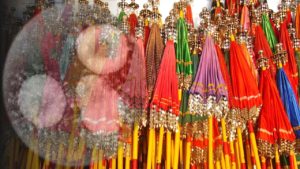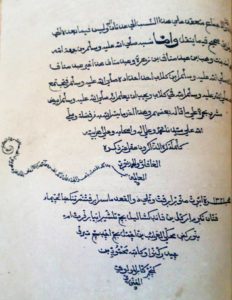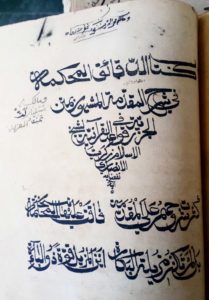Kerala’s COVID-19 response has gained international attention for its egalitarian approach. Ophira Gamliel reflects on how studying the Malayalam language provides insight into the culture that enables this success.
Ophira Gamliel

I just published a book on the Malayalam language after twelve years of research on its grammar and literature. Whom for? Why study Malayalam?
There are quite a few good reasons why non-Keralites may learn Malayalam. While some, like Elisa (a.k.a. Elikutty, who teaches Malayalam on her YouTube channel) do so because of a passion for language, some are attracted to it because of their interest in Kerala’s performance arts—either as performers or as spectators. The best performers in these fields are not very fluent in English (if at all), and the performance manuals are all in Malayalam. So, a serious engagement with the performance tradition requires some knowledge of Malayalam. But beyond communication needs and reading skills, the performance language of the body, the hand gestures and the facial expressions is just Malayalam. Even though it is non-verbal, it is nevertheless a left-branching, SOV language, with typical Malayalam syntax and pragmatics, such as the hand gesture for conveying the polite imperative form കണ്ടാലും.
And there are the scholarly, I should also say scientific, reasons to study Malayalam. Kerala’s history and society, from the earliest known Malayalam records in the ninth century to the present, are intriguing for humanists interested in cross-cultural exchanges and transregional knowledge flows, cognitive and theoretical linguistics, environmental humanities, and progressive transformations from a colonized country to a social democracy with low GDP and high HDI rates. These days, friends and colleagues around the plague-ridden world share posts and tweets praising Kerala for its progressive, inclusive, and deliberate response to an all-pervasive global challenge. Arguably, Malayalam Studies, outside Kerala that is, can satisfy a much broader range of interests than the outdated, old-fashion Indology to which it is currently confined, and that too in the awkward Indologist niche of “classical” languages.
Malayalam and the “classics”
The past two decades have seen increasing efforts to “classicize” Indian languages and to grant them the prestigious classical language status that Sanskrit has (Venkatachalapathy 2009). Malayalam was granted the classical language status in 2013, a year that also saw the establishment of the Thunchath Ezhuthachan Malayalam University. Soon after, in 2015, the Gundert Chair was announced in collaboration with the University of Tübingen, where both European and Keralite scholars teach regular Malayalam classes. But presenting Malayalam as a language of “classical” status does not necessarily bode well for Malayalam studies outside of Kerala and beyond the Indologist niche. The “classical” niche is an exclusive club, passing patronizing, unsubstantial judgements, such as the following:
Perhaps the most knowledgeable American scholar of Malayalam wrote: “Sorry to say I don’t really know anyone working in premodern Malayalam literature in universities in India. It’s always been a disappointingly unpopular field in Kerala. I’ve had to be self-taught, working with one very knowledgeable, very old retired linguist, and the occasional odd pandit-types” (Pollock 2011, 27).
Clearly, the vibrant teaching and learning of premodern Malayalam “classics” in Kerala escaped the attention of this anonymous American scholar. It might be, though, that the source of disappointment lies in the frustration of Indologists to find Indian pandits like those abundantly found in India during the heydays of colonialism. As A R Venkatachalapathy (2009, 13) notes, “[t]he clamour for being classical is most certainly a colonial hangover, marked by an anxiety to be recognised by the world (read, the west).” Ironically, Classical Studies never accepted into their ranks any language other than Greek and Latin, not even Sanskrit. Even Tamil, despite a century and a half of “classicism” efforts, could not break out of the exclusivist Indologist niche. The “classicism” honeytrap did not bode very well for Tamil either, as Sumathi Ramaswamy (1997) concludes:

In the (colonizing) knowledges which Tamil’s devotees inherited (or appropriated, as the case may be), the Tamilian had already been incorporated into an [sic] European and colonial economy of significations that assigned him a linguistic label and a racial category, decided whether he possessed a “history”, and determined whether his “culture” was worthy of being classified as a “civilization.” In engaging such knowledge practices, if only to encounter their assertions, tamiḻppaṟṟu further ensnared the Tamilian in this colonial economy of meanings in which it mattered – politically, economically, and psychologically – whether one’s language was a “classical” tongue or a mere “vernacular” whether one’s religion was “rational” or “idolatrous” and whether one possessed “civilization” or was “primitive”.
Malayalam, it seems, could never really appease the elite Indologists. A western Indologist, a scholar of Tamil (செந்தமிழ், of course) once joked that he studies the language of a “civilization,” while I, poor me, focus on this “uncivilized” Malayalam. I still don’t find this “civilized” joke funny, I’m afraid. I do, however, understand the Indologist’s disdain towards Malayalam. It is an ideological aversion, a subconscious one, I suppose.
Malayalam and folklore

Malayalam does not lend itself easily to exclusive “classicism”, at least not as readily as Sanskrit and Tamil do. The boundaries between “classical” and “folk” (നാടൻ) seem incongruent with the linguistic reality encountered in Malayalam literature. For example, the കൈകൊട്ടിക്കളി song repertoire features verses adapted from Kathakali plays alongside typical folksongs (Gopalakrishnan and Radhamadhavan 2004). Is this corpus folk or classical, then? Similarly, Arabic Malayalam literature challenges the “classical”/“folk” divide. In Malayalam literary histories, it is normally classified under “folk,” even though it entertains many elaborate poetic compositions, such as those of the famous Moyinkutty Vaidyar, a മഹാകവി scholar of Arabic and Sanskrit. Even the Māppiḷa Malayalam genre of wedding songs, the ഒപ്പനപ്പാട്ട്, cannot be simply classified as “folksongs”, with poets and poetesses carefully crafting these songs based on poetic conventions.
The label “classical” for മണിപ്രവാളം compositions too seems awkward, considering the many colloquial words and usages displayed in them. Sanskrit-oriented “classical” registers can be swiftly replaced by colloquial Malayalam, as, for example, verses 1:62 and 1:63 of the ഉണ്ണുനീലിസന്ദേശം, voicing, audibly and colloquially, passersby in a bustling fourteenth-century marketplace. I recall once visiting the Malayalam scholar Scaria Zacharia as he was rejoicing over a മണിപ്രവാളം verse, also from the ഉണ്ണുനീലിസന്ദേശം (1:115), where a colloquial term, എച്ചിൽക്കിണ്ണം (waste plate), was used as a metaphor for the sky during sunrise:
കച്ചയ്ക്കൊക്കെക്കതിനനെ മുറിച്ചുച്ചകൈർദ്ദിഗ്ഗജേന്ദ്രാ
നച്ചച്ചച്ചോ ശിവശിവ മഹാഘോരമോരോ യുഗാന്തേ
പച്ചച്ചോരിക്കളി വെതുവെതെക്കോരിയാര ക്കുടിച്ചോ
രെച്ചിൽക്കിണ്ണം തവ വിയദിദം ദേവി തുഭ്യം നമോസ്തു
I could find this verse online, discussed by a Malayali blogger as well as the full text of the ഉണ്ണുനീലിസന്ദേശം, including a commentary, digitized and uploaded by the publisher, Kerala Sahitya Akademi. American scholars need not worry about the popularity of premodern Malayalam literature; it is popular enough in Kerala to be uploaded and discussed online.
Transformative Malayalam
The patronizing concern or, alternatively, elitist disdain of Indologists towards Malayalam may have to do with Kerala’s egalitarian scholarly environment. Subaltern Malayalam literature is cherished in Kerala’s education system, supported by government publications without favouring the “classical” over the “folk” or the other way round. It is no coincidence that the greatest scholar of Theyyam ballads was a Brahmin, M V Vishnu Namboothiri, whose numerous annotated publications of Theyyam and Thottam songs are an act of transgression of the divide between elite scholarship and subaltern creativity. Kerala’s Marxist scholarship promoted the preservation and study of subaltern voices and cultures as by Raghava Varier (1983), whose work on the Northern Ballads is a must-read in Malayalam and folklore departments. So, here is another reason for foreign scholars to study Malayalam; it is transformative, in the Gramscian sense of the term transformation. “In his [Gramsci’s] synthesis, language is clearly and explicitly conceived as both interpretive and transformative, that is, as both necessary to interpret and to transform [the] world.” (Lacorte 2010, 221).
I am now writing while sitting in lockdown in one of the richest countries in the world, the same country that colonized Kerala for over a century and a half. The whole world is undergoing a radical, pandemic-induced transformation, not always as inclusive and progressive as envisioned in development studies and UN policy briefs. I keep comparing Kerala’s response to the pandemic with that of the country I live in (UK), the country I was born in (Israel), and other countries in Europe and around the world. Kerala’s response is remarkably inclusive, progressive, deliberate, and two-directional – top-down and bottom-up. Take migrant workers, for example. In Kerala, they were immediately embraced as “guest workers” (അതിഥി ദേവോ ഭവഃ) and provided with government support. Kerala’s transformative response to the crisis did not skip international observers this time, as opposed to the relatively unnoticed heroic response of Keralites to the flood disasters in 2018 and 2019. In recent weeks, for example, Jason Hickel, a UK-based progressive economist, has been tweeting praises for Kerala’s response to the pandemic.
This is not for promoting some “exceptionalism” for Kerala and Malayalam. Knowledge of languages—especially of those least studied internationally—is important and potentially transformative, especially for development studies where despite their “global South” orientation, English rules supreme. Still, Malayalam literature (premodern and modern alike) is so remarkably inclusive and pluralistic that it offers new and exciting pathways for research on possibly the most pressing questions nowadays on the interfaces between culture and disaster risk reduction towards humane, equitable, and progressive transformation.
References
- Gopalakrishnan, Sudha and Radhamadhavan. 2004. കൈകൊട്ടിക്കളിപ്പാട്ടുകൾ. കേരള സർക്കാർ സാംസ്കാരിക വകുപ്പ്.
- Lacorte, Rocco. 2010. “Translatability, Language, and Freedom in Gramsci’s Prison Notebooks.” In Peter Ives and Rocco Lacorte (eds.), Gramsci, Language, and Translation. Lanham: Lexington Books, pp. 213 – 225.
- Pollock, Sheldon. 2011. “Crisis in the Classics”. Social Research 78(1): 21 – 48.
- Ramaswamy, Sumathi. 1997. Passions of the Tongue: Language Devotion in Tamil India, 1891–1970, Berkeley/ Los Angeles/ London: University of California Press.
- Varier, Raghava. 1983. വടക്കൻ പാട്ടുകളുടെ പണിയാല. വളളത്തോൾ വിദ്യാപീഠം.
- Venkatachalapathy, A. R. 2009. “The “Classical” Language Issue”. Economic and Political Weekly (January 10, 2009): 13 – 15.
About the author: Ophira Gamliel is a lecturer in South Asian Religions at the University of Glasgow. She is the author of A Linguistic Survey of the Malayalam Language (2020) and of several articles related to Kerala’s culture, history, and languages. She wrote her PhD on Jewish Malayalam Women’s Songs at the Hebrew University of Jerusalem, where she also taught Malayalam and Sanskrit. She co-authored with Scaria Zacharia a bilingual publication of Kerala Jewish women’s folksongs in Malayalam and Hebrew Karkuzhali-Yefefia-Gorgeous (2006). Ophira can be contacted at Ophira.Gamliel@glasgow.ac.uk

👍Good one
Thanks 🙂
Thank you so much for this really interesting post, Dr. Gamliel.
I really enjoyed it.
Despite all that had been said and written about the extreme caste demarcations prevalent in Kerala until the late 19th century, ideas, interactions and art found their own ways of percolating into each other, and this found its full flowering in early 20th century politics. This I think is the foundation upon which the wonderfully egalitarian society found in Kerala today. As all children growing up in Kerala, we memorised reams of poetry. One of our past-times was akshara-sloka malsaram, which if I’m right, continues to be so among children in this digital age. And one could not escape the poetry and incisive wit of political slogans of alliterative rhyming couplets:
‘Mohana sundara vagdanangal Gaurikkano Thommacha
Ha! naanam veende Thommacha!’
Admittedly, their landscape lacks stunning monuments in stone (unlike their kinsmen to the east) but this lacuna is made up in ample measure by their inner landscape of literature and word-play, regardless of whether the Malayalam language is assigned ‘Classical’ status or not. The Keralites’ mindset – of people from all sections of society – is reflected in their readiness with an apt sloka or ready wit at every turn of life’s encounters.
Your work is commendable because it has brought awareness among Western scholars of the many joys of the Malayalam language and its people that much physically closer. It is great that it is not confined to its grammar and linguistics alone, but rather extends into the world of its literature and the lived life of its people in all its aspects of high culture of literature, performing arts, political maturity and social consciousness.
Thank you so much for your kind words and detailed appreciation!
👍
🙏🏽